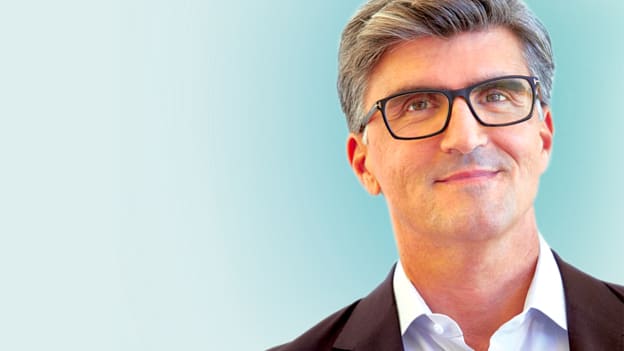'AI, automation will help make work much more meaningful'

Steve is a principal with Deloitte Consulting and serves as the Global Leader for Future of Work for the firm. He has more than 20 years of experience advising global organizations on issues of strategy, innovation, organization, people, culture, and change. Hatfield has advised business leaders on a multitude of initiatives including activating strategy, defining a preferred future, addressing workforce trends, implementing agile and resilient operating models, and transforming culture oriented to growth, innovation, and agility.
Hatfield has significant experience in bringing to life the ongoing trends impacting the future of work, workforce, and workplace. He is a regular speaker and author on the future of work and is currently on the Deloitte leadership team shaping the research and marketplace dialogue on the future workforce and workplace trends and issues. He has a master’s in social change and development from Johns Hopkins and an MBA from Wharton and is based in Boston.
Here are the excerpts of the interview.
You have been advising global organizations on issues of strategy, innovation, organization, people, culture, and change for over 20 years. Can you share some insights around what have you learned from the larger conversations with top business executives of those organizations?
What we've noticed is that it's a much more complex mix of things that executives need to bring to the table to excite and engage a workforce for higher productivity. Given shortages for critical skills, emerging required capabilities and generational preferences, if you don't actually have a cogent workforce strategy, then likely whatever business strategy you are aiming for won’t happen. If you aren’t organized in a way that enables learning, exploration, and innovation, or if your people are just cogs in a big machine unexcited by the work they’re doing, then you won’t achieve the strategy and innovation objectives that you’re looking for. The human (and worker) experience becomes central and that becomes the emerging focus.
You have devoted much of your life to researching what's next. If you were to look back, what are some of the changes that have taken place over the last few years and what are the implications of them for the future?
We have seen more and more dollars going into collaboration tools, learning, redesigning the workplace, and programs like workforce flexibility. This was demanded by Gen X and late stage Millennials—and the workplace has responded—but we’re only scratching the surface on where this is headed. Now with the advent of technologies that enable workers to be effective virtually, worker preferences about where they work, how they work and when they work have become more paramount. For the future of learning, we need to harness these new worker preferences to curate knowledge and bring learning to the team level where innovation is happening while also collecting enterprise intelligence.
For the future of learning, we need to harness new worker preferences to curate knowledge and bring learning to the team level where innovation is happening while also collecting enterprise intelligence
What's your vision for the future of work now that business dynamics are changing and new age technologies are emerging? How do you view the current skills gap scenario?
The dialogue in the market is often geared towards the robot apocalypse because this grabs media attention, but if you look at what’s happening, it’s a world of opportunity. As more people can access the internet (seven billion predicted in the next five years) and with 5G capability, there’s the ability for people to plug into economic flows from any part of the world1. Upwork, a gig platform to provide higher value add work to an enterprise, for example, sources work from 180+ global locations with freelancers representing more than 5,000 skills2. Imagine, a Millennial woman who creates marketing materials in Malaysia can now plug into a North American opportunity without leaving her home. We do see a skills gap emerging because of skill shortages and emerging capabilities. In some ways, we expect this to increase because of 50 million new tech jobs and the anticipated increases in the creative class, professional class, and non-routine manual work like home healthcare. However, this puts more emphasis on the critical needs to the upskilling and reskilling workforce. According to the Deloitte 2019 Human Capital Trends report, 54 percent of companies state they have no programs in place to build the skills of the future, yet 86 percent of respondents cited reinventing the way people learn as important or very important.
Can technology actually compliment the future human workforce now that AI and automation are transforming business models and the nature of work? How do you view the landscape of future employment?
The advent of AI technology and greater automation create the opportunity for work to become much more meaningful. In fact, AI taking over both simple and complex tasks creates capacity for higher value work. For example, AI can help decrease the amount of administrative work that is being done so that a nurse can focus on better bedside care instead of inputting patient data into a computer. Even augmenting the workforce with robots and drones, as we see with Energy, Resource and Industrial companies, can lead to solutions for increased worker safety. These technologies will only be a value add for the future of employment.
With companies struggling to anticipate the needs and expectations of future generations of the workforce, how should organizations gear up to face the future challenge in a world where uncertainty is the new normal?
Today, we put a lot of energy and effort into anticipating and solving for different customer needs using data sets in a bespoke way. What’s going to emerge is that the same toolkit of data sets and technologies will be applied to the workforce, creating bespoke solutions for employees as well. This will enable an enterprise that feels more like an umbrella of startups, creating a dynamic career marketplace that fosters strong resiliency and adaptability for the organization to handle changes as they come.
With organizations shifting their culture to become more focused on building capabilities for innovation, and the ability to act like owners, do you think culture can actually be a competitive advantage?
There are those that would argue that culture is already a competitive advantage. I think of the phrase made famous by Mark Fields, President of Ford "culture eats strategy for breakfast". I think though that sometimes culture is confused with engagement. Culture is the behavior set of an organization, the unwritten rules. Let’s say a leader is not the kind of person who goes around the table and asks for everyone’s opinion, he or she may not be fostering a strong innovation culture because workers don’t feel comfortable speaking up. It’s these behavior sets paired with programs for engagement that will be very important dimensions for how we handle innovation in the future.
There seems to be a renewed focus on leadership with the rise of next-gen technologies and changing business dynamics. Do you think we have enough digital leaders with requisite leadership capabilities to drive change businesses need today? How do you view the current landscape?
Leadership development programs will shift and calibrate to be more geared to enduring human capabilities. It’s not just empathy and hypothesis-driven problem-solving capabilities, but also venture management, complex systems thinking, pattern recognition, etc. These capabilities become hallmarks of what digital leaders need to bring to the table. Leaders can develop these skills, but they need to do it as a practicum where the capabilities can be applied and honed over time
What's your leadership style? What leadership techniques have you found don't work for you?
I liken myself to a corporate anthropologist. I bring a skillset around complex systems thinking, seeing patterns and discerning the future. With my team, I am clear about what outcomes need to be met and then I give them the space to bring their strengths to the table in achieving those outcomes. I have very little patience for leaders who declare they know more than they do or aren't up to speed with what they are talking about. Although I spend time thinking about the future, I am also very authentic about what we don’t know yet.
What's your take on the digital transformation initiatives organizations are going through? Experts say it's more about culture and mindset shift than technologies powering it.
It's very much a mindset shift, a set of capabilities and a culture that can adapt to digital transformation. Technologies are on an exponential curve and are changing every 18 months. So, it is not about individual technologies like early-stage blockchain, AI or robotics—it’s about creating a culture that is open, receptive, adaptable and fosters a passion for learning that will become critical for keeping abreast of all the changes that are coming.
Prepare your organization for the evolution to adaptable ecosystems and teams by shifting way from hierarchies
What is real about the gig economy? And how are they going to impact the future of work?
The gig economy is very real—by 2020, the number of self-employed workers in the U.S. is expected to triple to 42 million people, but only eight percent of Deloitte’s 2019 Global Human Capital Trends report respondents had established processes to manage and develop alternative workforce sources. Deloitte is urging organizations to start thinking about experimenting with their talent models, expanding the view of their organization to be an ecosystem of players contributing to the outcomes they want. What will likely happen is that it won’t be about attracting talent, as much as it will be about accessing the capabilities from within your ecosystem as you need them.
If you were to share five pieces of advice to large gatherings of CHROs and People leaders on how they should gear up to prepare for the future of work what would that be?
It can be difficult to know where to start on your Future of Work journey. Here are five considerations you can begin to act on today…
- Redesign jobs: Begin designing “superjobs” by identifying integrated roles that leverage the significant productivity and efficiency gains possible when people and machines work together and provide more meaningful work to employees
- Reskill your talent: Develop a culture of continuous learning, incentives that motivate people to learn, and a focus on helping individuals identify and develop new, needed skills
- Reengineer your workforce: Move beyond “managing” contractors and freelancers to “optimizing” and “leveraging” the alternative workforce deliberately and well
- Reconstruct teams: Prepare your organization for the evolution to adaptable ecosystems and teams by shifting way from hierarchies
- Refresh the human experience: Address the “human experience” at work—building on an understanding of worker aspirations to connect work back to the impact it has on not only the organization but also society as a whole.
--------------------------------------------------------------------------------------------------------------------------
Note
1. 2019 Global Human Capital Trends report
2. Upwork 2018 Annual Report
















